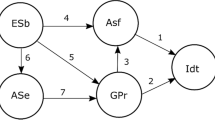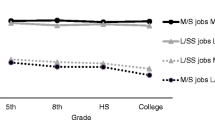Abstract
Following the recommendations of Lent, Brown and Hackett's Social Cognitive Career Theory (2000), we measured eighth grade boys' and girls' perception of the proportion of men and women employed in occupations and their level of interest and self-efficacy for those occupations. Results indicated that eighth grade boys and girls expressed stronger career interest in and higher self-efficacy for those occupations that they rated as employing more of their own gender. The study highlights how career practitioners can work with adolescents to widen their perceived range of occupational choices.
Similar content being viewed by others
References
Betz, N. E., & Hackett, G. (1981). The relationship of career-related self-efficacy expec-tations to perceived career options in college women and men. Journal of Counsel-ing Psychology, 28(5), 399–410.
Eccles, J. S. (1987). Gender roles and women's achievement-related decisions. Psychology of Women Quarterly, 11, 135–172.
Fouad, N. A. (1995). Career Linking: An intervention to promote math and science career awareness. Journal of Counseling and Development, 73, 527–534.
Gottfredson, L. S. (1981). Circumscription and compromise: A developmental theory of occupational aspirations. Journal of Counseling Psychology, 28(6), 545–579.
Gottfredson, L. S., & Lapan, R. T. (1997). Assessing gender-based circumscription of occupational aspirations. Journal of Career Assessment, 5(4), 419–441.
Lapan, R. T., & Jingeleski, J. (1992). Circumscribing vocational aspirations in junior high school. Journal of Counseling Psychology, 39(1), 81–90.
Lent, R. W., Brown, S. D., & Hackett, G. (1994). Toward a unifying social cognitive theory of career and academic interest, choice, and performance. Journal of Voca-tional Behavior, 45, 79–122.
Lent, R. W., Brown, S. D., & Hacket, G. (2000). Contextual supports and barriers to career choice: A social cognitive analysis. Journal of Counseling Psychology, 47(1), 36–49.
Post-Kammer, P., & Smith, L. P. (1985). Sex differences in career self-efficacy, consid-eration, and interests of eighth and ninth graders. Journal of Counseling Psychology, 32 (4), 551–559.
Strong, E. K. (1985). Strong interest inventory manual. Palo Alto, CA: Stanford University Press.
Author information
Authors and Affiliations
About this article
Cite this article
Ji, P.Y., Lapan, R.T. & Tate, K. Vocational Interests and Career Efficacy Expectations in Relation to Occupational Sex-Typing Beliefs for Eighth Grade Students. Journal of Career Development 31, 143–154 (2004). https://doi.org/10.1007/s10871-004-0571-8
Issue Date:
DOI: https://doi.org/10.1007/s10871-004-0571-8




